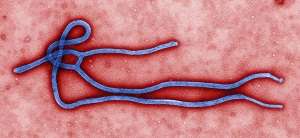 |
| Ebola virus under an electron microscope--Courtesy of CDC |
GlaxoSmithKline ($GSK) is looking to set some drug development records as it races to the clinic with an Ebola vaccine, posting promising results in preclinical study as a public health crisis unfolds in Africa.
In a study published Monday in Nature, researchers administered GSK's candidate on macaques, exposing them to a lethal dose of Ebola 5 weeks later. Every monkey in the treatment arm survived with no symptoms of the virus, while each animal in the placebo group died within 6 days, according to the study.
The findings stoke already high hopes for GSK's candidate, which it acquired through its $325 million buyout of Okairos last year. The company, alongside the National Institutes of Health, planning to kick off Phase I human trials this month, looking to determine the vaccine's safety in healthy volunteers. GSK has the ambitious goal of wrapping up early studies in just three months, hoping to quickly roll its candidate out into the field.
Meanwhile, an Ebola outbreak in West Africa has claimed more than 2,000 lives, according to the World Health Organization, and the group has repeatedly called for regulators and drugmakers to work together and accelerate the development of vaccines and potential treatments for those already infected.
Johnson & Johnson ($JNJ) has answered the call, teaming up with the National Institute of Allergy and Infectious Diseases and Denmark's Bavarian Nordic to get to work on an early-stage vaccines. Mapp Biopharmaceutical, which has snagged global headlines with its promising post-infection treatment, has secured up to $42.3 million in federal cash to dial up its efforts and manufacture more of its experimental antibody cocktail.
The rash of attention heaped on Ebola R&D has drawn scores of smaller biotechs to the table, including NewLink Genetics ($NLNK), which plans to start human trials on a vaccine candidate next year, and Tekmira Pharmaceuticals ($TKMR), whose RNAi-based treatment faced serious safety concerns before the recent outbreak forced regulators to give it another look. Hemispherx Biopharma ($HEB), a long-troubled biotech long since relegated to penny-stock territory, watched its shares soar on Monday after announcing that the U.S. Army Medical Research Institute of Infectious Diseases was planning to study two of its candidates against the virus.
- read the study